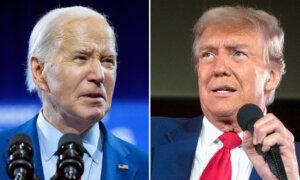‘I cannot imagine a need for the instruction unless there was an early disagreement in that room on the evidence and the standards,’ he said.
Jonathan Turley, a prominent law professor who was in the courtroom during Wednesday’s proceedings in former President Donald Trump’s criminal trial in New York, said that he sees signs of “early disagreement” among the jury after jurors asked to rehear the judge’s instructions.
Prosecutors have alleged that President Trump fraudulently misclassified non-disclosure payments to adult film actress Stephanie Clifford as part of an attempt to influence the 2016 presidential election in which he was a candidate.
President Trump maintains his innocence and has alleged that the trial is a politically-motivated bid to undermine his 2024 presidential run.
As the jury deliberated, the jurors sent a series of notes to the judge, including one that requested testimony transcripts and another, filed at 3:51 p.m., asking to re-hear Judge Merchan’s instructions.
Mr. Turley, who has been commenting on the day’s proceedings from his vantage position in the courtroom, took to X to express the view that the request to rehear the instructions is a possible sign of disagreement among jurors.
After the jurors re-entered the courtroom in the afternoon, the judge told them that the compilation of testimony they had requested for a readback was not yet complete and so he dismissed them—before admonishing them not to discuss the case with anyone.
Jury deliberations are scheduled to resume at 9:30 a.m. the following day.
“The framing of this case and failure to protect the rights of the defendant have undermined the perceived legitimacy of the proceedings and any possible verdict,” he wrote.
Jury Instructions in Focus
In the case, Manhattan District Attorney Alvin Bragg charged President Trump with 34 counts of falsifying business records in order to conceal an alleged $130,000 non-disclosure payment to adult film actress Stormy Daniels.
Under New York state law, falsifying business records by itself is a misdemeanor. But if the records fraud was used to cover up or commit an underlying crime, the charge could be elevated to a felony.
Judge Merchan’s jury instructions could prove crucial in the case because even small nuances in the instructions can make a big difference when a jury weighs whether to find President Trump guilty or not guilty.
The judge told jurors in his instructions that prosecutors must persuade them on two aspects of the count of falsifying business records in the first degree in order for them to convict: one is that President Trump “personally, or by acting in concert with another person or persons, made or caused a false entry in the records” of a business and, two, that the former president did so with the intent to commit or conceal another underlying crime—conspiring to interfere in an election.

Judge Merchan told jurors that in order to determine whether President Trump conspired to promote or prevent the election of any person to a public office by unlawful means, they may consider three possible unlawful means, on which they don’t have to agree.
“Although you must conclude unanimously that the defendant conspired to promote or prevent the election of any person to a public office by unlawful means, you need not be unanimous as to what those unlawful means were,” the judge said.
The three alleged unlawful means that jurors are to consider are: violations of federal campaign finance law; falsification of other business records, such as bank records or tax forms; and violation of city, state, and federal tax laws, including by providing false or fraudulent information on tax returns, regardless of whether it resulted in underpayment of taxes or not.
A number of legal experts have raised objections to this aspect of the judge’s instructions, including Mr. Turley and former Kansas attorney general Phillip Kline, who’s now a law professor.
Original News Source Link – Epoch Times
Running For Office? Conservative Campaign Consulting – Election Day Strategies!

![[LIVE Q&A 05/30 at 10:30AM ET] White House Defends Use of Trump Trial for Campaign](https://www.theepochtimes.com/_next/image?url=https%3A%2F%2Fimg.theepochtimes.com%2Fassets%2Fuploads%2F2024%2F05%2F29%2Fid5659242-CR-TN_REC_053024-300x180.jpg&w=3840&q=75)
